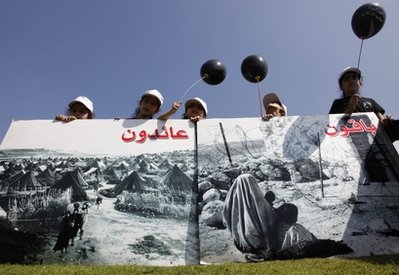By: – Nabil Sha’ath

Today Israel celebrated 62 years since its formation on 15 May 1948. For Palestinians, today marks the 62nd year since the Nakba – our national and personal catastrophe, involving the loss of our ancestral homeland and the dispersal of three-quarters of our people into exile.
To date, the Palestinian people await Israeli recognition of its responsibility in the catastrophe and agreement to resolve the conflict based on international law, including UN resolutions.
I experienced exile first-hand. On 13 May 1948 one day before Israel’s declaration of independence, my hometown of Jaffa was captured by Zionist forces. Seventy thousand Palestinian inhabitants of the city were forced to leave, most of them by sea to Gaza, Egypt, and Lebanon. We Jaffans were literally driven out to the sea. I was 10. We were never allowed to return.
The same reality befell more than 726,000 indigenous Christian and Muslim Palestinians who fled their homes or were expelled from Mandate Palestine in and around 1948; while hundreds of Palestinians were killed as they were driven out, or in their attempt to come back home. Several Israeli historians such as Benny Morris and Ilan Pappe described the catastrophe vividly and accurately.
In the wake of the expulsion, more than 418 Palestinian villages were razed to the ground. Nearly all Palestinian property, including that belonging to Palestinians who managed to stay within the areas that came under Israeli control, was confiscated by the nascent State of Israel for the exclusive benefit of Jews. In 1952, when Israel’s parliament passed its nationality law, Palestinian refugees were denied the option of citizenship in the new state. Additional measures were taken to bar our return to our country and our homes. The expulsion of Palestinians and the subsequent measures to render the displacement permanent were taken in contravention of international law.
These events, which left the majority of Palestinians stateless and dispossessed, were compounded by the Israeli military occupation of the West Bank and Gaza Strip in 1967. Hundreds of thousands of Palestinians once again fled their homes, and Israel expanded its control over the remaining 22% of our historic homeland. Today, the stranglehold over the Gaza Strip, the ongoing settlement and closure activities in the West Bank, including East Jerusalem, is leading to more Palestinian fragmentation and displacement. Indeed, the Nakba continues.
Today, there are more than 7 million Palestinian refugees. They constitute the largest refugee population in the world and one of the world’s longest unresolved refugee crises. Palestinian refugee vulnerability, brought about as a result of their protracted mass exile and statelessness, is contributing to Middle East regional instability and insecurity, from Iraq to Lebanon to the Gaza Strip.
As a Palestinian, I cannot forget the uprooting of my nation, which has shaped my history and which has created the continuation of a reality of hardship for my people. At the same time, Palestinians have expressed their desire to achieve conciliation and move forward based on an accommodation grounded in the acknowledgment and just implementation of our rights.
In the course of the 62 years since the Palestinian Nakba, Israel’s responsibility for the forced displacement and dispossession of the Palestinian people has been clearly established by historians (many of them Israelis) and international legal scholars. The right of individual Palestinians to choose whether to return to their homes and determine their own destinies has continued to be reaffirmed by the international community in UN General Assembly Resolution 194. Yet, this historical injustice remains officially unacknowledged and the human rights of Palestinians denied.
I profoundly regret that Israel continues to disregard the Arab Peace Initiative (API), adopted by the Arab League in Beirut in March 2002. The API calls for an independent Palestinian state in the West Bank and Gaza Strip along the pre-1967 borders, with East Jerusalem as its capital, and a just solution to the Palestinian refugee problem to be agreed upon in accordance with UNGA Resolution 194, in exchange for normalization of relations with Israel and a lasting peace. The API has been repeatedly reaffirmed by Arab countries. Additionally, the Organization of the Islamic Conference (OIC) which represent 57 Islamic countries worldwide has endorsed the API as the basis to end the Arab/Palestinian Israeli conflict. What this means, in practical terms, is achieving peace between Israel and more than 1.2 billion Arabs and Muslims worldwide.
Peace is made between equals, through the respect of each side’s history and identity, and understanding the discourse of the “Other”. As history proves, States commit wrongs, but States are strengthened when they acknowledge and apologize for those wrongs. To end the denial, the suffering, and the resentment that has led to violence and conflict, to reach the accommodation proposed by the Arab Peace Initiative, it is necessary that the Palestinians be recognized as dignified human beings entitled to the same treatment and laws as other refugees and victims of conflict including their right to return and to exercise freedom of choice consistent with peace and security for all.
To achieve real peace, it will be necessary for Israel to acknowledge its responsibility in the creation and perpetuation of the plight of the refugees. Such an acknowledgment is not a threat to its existence. It is in fact the exact opposite. By doing so, Israel would inevitably empower our respective citizens and leadership to establish peace based on political accommodation.
On the 62nd commemoration of the Palestinian Nakba, I invite Israel to acknowledge its responsibilities, recognize our rights and suffering, and work with us for a breakthrough for peace, historical reconciliation, and an end of conflict.
Nabil Shaath, the author, is a member of the Fatah Central Committee in charge of International Relations and is the former Palestinian Foreign Minister. A version of this article originally appeared in El Pais, printed in Spain. It is republished here with permission from the author.

Leave a Reply
You must be logged in to post a comment.